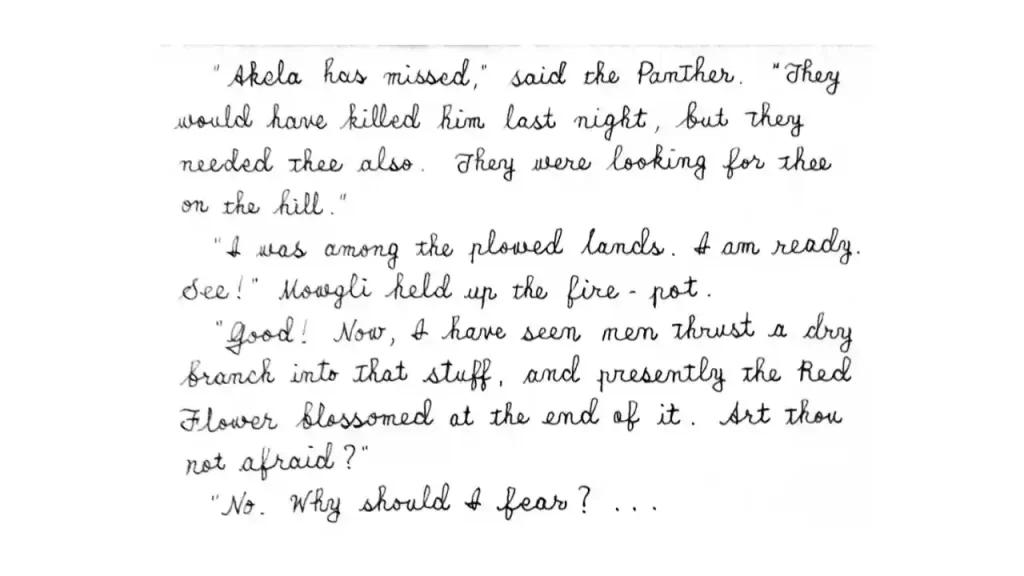“Akela has missed,” said the Panther. “They would have killed him last night, but they needed thee also. They were looking for thee on the hill.”
The Jungle Book
- Japanese grammar
- subject: かれら
- predicate: さがす
- modifier: おまえを
日本語訳:
「アキーラが失敗した」バギーラが言いました。
「彼らはアキーラを昨夜殺すつもりだったが、お前が捕まらなかった。彼らは丘でお前を探していたのだ」
- Kanji, Hiragana
- 昨夜(さくや, last night)
“昨夜” refers to the evening or nighttime of the previous day. It is commonly used in both spoken and written Japanese to indicate events or actions that took place the night before. The kanji 昨 (さく) means “previous” or “yesterday,” and 夜 (や) means “night.”
“I was among the plowed lands. I am ready. See!” Mowgli held up the fire-pot.
- subject: モウグリ
- predicate: かかげる
- modifier: ファイアポットを
「私は耕作地の中にいたんだ。準備できているぞ。見てくれ!」モウグリはファイアポットを掲げました。
- 掲げる(かかげる, raise / hold up / proclaim)
“Good! Now, I have seen men thrust a dry branch into that stuff, and presently the Red Flower blossomed at the end of it. Art thou not afraid?”
- subject: わたし
- predicate: みたことがある
- modifier: レッドフラワーが・さくのを
「よし!人間たちが乾いた枝をそれに押し付けて、少しするとレッドフラワーが枝の端に咲くのを見たことがある。怖くないのか?」
- 咲く(さく, bloom / blossom)
- Antonym: 散る(ちる, fall / scatter)
“咲く” is a verb meaning “to bloom” or “to blossom,” typically referring to flowers opening up. It can also be used metaphorically to describe something coming into full form—like a smile (笑顔が咲く), talent (才能が咲く), or happiness blooming. The kanji 咲 carries the nuance of natural unfolding and beauty.
“No. Why should I fear? I remember now—if it is not a dream—how, before I was a Wolf, I lay beside the Red Flower, and it was warm and pleasant.”
- subject: わたし
- predicate: レッドフラワーのそばにいる
- modifier: オオカミになるまえ
「怖くない。なぜ私が怖がると思うんだ?
思い出した。それが夢じゃなければ、私はオオカミになる前に、レッドフラワーのそばにいたんだ。暖かくて、快適だった」
All that day Mowgli sat in the cave tending his fire pot and dipping dry branches into it to see how they looked.
- subject: モウグリ
- predicate: めんどうをみる
- modifier: ファイアポットの
日中ずっと、モウグリは洞窟に座って、ファイアポットの面倒を見て、枯れ枝をいれて様子を見ていました。
- 面倒を見る(めんどうをみる, take care of / look after)
- 様子を見る(ようすをみる, observe / wait and see)
He found a branch that satisfied him, and in the evening when Tabaqui came to the cave and told him rudely enough that he was wanted at the Council Rock, he laughed till Tabaqui ran away. Then Mowgli went to the Council, still laughing.
- subject: モウグリ
- predicate: むかう
- modifier: カウンシルへ
モウグリは満足のいく枝を見つけました。
午後にタバキが洞窟に来て、カウンシルロックで指名手配されているとモウグリに失礼な物言いをすると、モウグリはあざ笑いました。タバキが立ち去るまでずっと。
そのあと、モウグリはカウンシルへ向かいました。笑い続けながら。
- 満足のいく(まんぞくのいく, satisfactory / fulfilling)
- 指名手配(しめいてはい, wanted notice / wanted person alert)
This phrase describes something that is “satisfactory” or “fulfilling.” It combines 満足 (satisfaction) with the verb 行く, functioning idiomatically to express that something meets expectations or personal standards. It’s often used before nouns, like “満足のいく結果” (a satisfactory result), to express emotional or qualitative fulfillment.
Reference : The Jungle Book by Rudyard Kipling (project gutenberg)
English Story With Easy Japanese Translation
